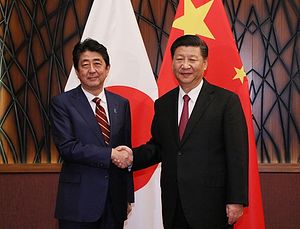Yet again, Japan’s foreign minister has expressed an ambiguous, noncommital interest in China’s Belt And Road Initiative (BRI). It seems that Japan is using the traditional technique of aimai to deal with the BRI.
Aimai or 曖昧, often translated to “ambiguity” in English, actually has a wide range of meanings, including “vague, obscure, equivocal, dubious, doubtful, questionable, shady, noncommittal, indefinite, hazy, double, two-edged, and so on,” according to the book, The Japanese Mind: Understanding Contemporary Japanese Culture.
On November 18, Japanese Foreign Minister Taro Kono said in his address at Kanagawa Prefecture that the BRI will be “highly conducive to global economy if carried out in an open manner that is available to all.”
It is a typical expression of aimai, because Kono’s words imply both Japan’s interest in joining the BRI and its discontent toward the BRI’s exclusiveness.
Interestingly, Beijing decided to highlight the positive connotation only.
At the regular press briefing on November 21 , Chinese foreign ministry spokesperson Lu Kang said Beijing has noted Kono’s remarks and welcomed Japan’s “positive attitude” toward the BRI.
In response to Kono’s doubts toward the BRI’s “exclusiveness,” Lu said:
The Belt and Road is an important international public good China has offered in a bid to promote development cooperation, and it is set to be an open and inclusive cooperation platform from the very beginning. China always upholds the principle of wide consultation, joint contribution and shared benefits and acts in the silk-road spirit of peace and cooperation, openness and inclusiveness, mutual learning, and win-win cooperation to deepen mutually beneficial cooperation with various parties.
Lu even further extended an invitation to Japan, saying that “the in-depth advancement of the Belt and Road will not only create greater room for China’s opening and development, but also present more opportunities for the development of Japan and other countries as well as the global economy.”
As The Diplomat has been following, China and Japan are apparently moving toward a rapprochement.
Japan shown a series of friendly gestures to China — including Japanese Prime Minister Shinzo Abe making a surprise appearance at an event at the Chinese Embassy in Tokyo and meeting with the Chinese president and premier on the sidelines of the APEC and ASEAN meetings, respectively.
China has returned the favor. Besides Lu’s apparent invitation mentioned above, on the same day, Chinese Premier Li Keqiang met with a delegation of more than 250 business leaders from major Japanese enterprises. The delegation was led by Chair of the Japan Business Federation Sadayuki Sakakibara, President of the Japan-China Association on Economy and Trade Shoji Muneoka, and Chair of the Japan Chamber of Commerce and Industry Akio Mimura.
According to Xinhua, during the meeting, Li urged the Japanese business community to “exert their own influence to” enhance mutual ties, since “the development of Sino-Japanese relations can not be separated from the promotion of economic and trade cooperation.” Li added:
China and Japan should work together to safeguard economic globalization, speed up the negotiations on the Regional Comprehensive Economic Partnership (RCEP) and free trade area talks between China, Japan, and the Republic of Korea, so as to contribute to the stability and prosperity of the region and the world.
Li’s words toward the Japanese delegation sounded like an indirect reply to Kono’s remarks on the BRI as well.
In July, Abe had already expressed Japan’s willingness to get involved in the BRI, as long as “the initiative will contribute to regional and global peace and prosperity by adopting ideas held by all in the international community. ”
However, Japan is in the meantime hedging against the BRI. As The Diplomat’s Shannon Tiezzi noted, during U.S. President Donald Trump’s visit to Japan on November 5 and 6, the United States and Japan signed new agreements to promote infrastructure projects in Asia and Africa — seemingly an alternative to China’s BRI.
Under the current circumstances, Japan’s aimai approach toward the BRI will likely remain.

































